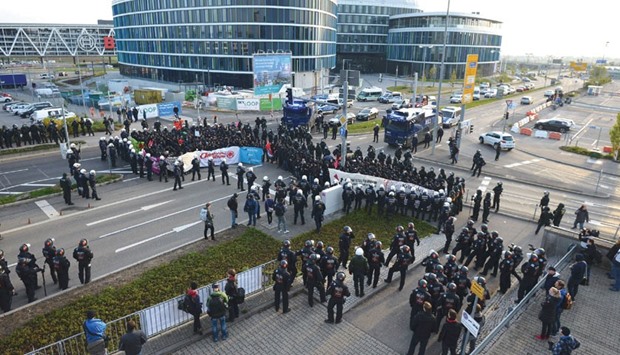
Anti-AfD protesters and police forces face off outside the Stuttgart Congress Centre ICS, where the AfD congress was to take place.
Police detained 500 leftist protesters yesterday outside the venue of the right-wing populist Alternative for Germany (AfD) party’s congress in Stuttgart after several hours of clashes.
Police counted up to 2,000 left-wing protesters, some of whom burned tyres and hurled stones and fireworks to try to stop the AfD’s congress going ahead in Stuttgart.
Two police officers were slightly injured, but there were no reports of injured among the protesters, police spokesman Lambert Maute said.
More than 1,000 security personnel were deployed to prevent confrontations between AfD members and leftist protesters.
The demonstrators held banners and shouted: “Refugees stay, Nazis go.”
Others chanted, “Nazis out. Bye-bye AfD.”
Calm returned by the afternoon, police said, with many demonstrators moving to Stuttgart’s city centre.
Police said around 1,800 people continued the protests there, while organisers put the count at least 4,000.
No riots occurred in the centre, police said, though multiple officers were hit by bags of faecal matter.
There were also reports of smoke bombs and flares being set off.
Buoyed by the migrant crisis, the AfD has upended German party politics.
After the congress started late, more than 2,000 AfD members listened to their party leaders’ call for an end to Merkel’s refugee-friendly politics and a return to Christian values.
“We always wondered when the brave child will finally appear to voice the thoughts of the silent majority and declare that the ‘Chancellor of no alternatives’ is nothing but naked,” said party leader Frauke Petry, 40, in her opening speech. “And I think, this brave child is us.”
The violence began around dawn and clashes continued for several hours.
Police personnel used pepper spray and threatened to use water cannons to stop protesters, some of whom were masked, from getting onto the grounds of the conference.
Some demonstrators still managed to assault several party members, they said.
Having initially railed against bailouts for debt-hit eurozone economies, AfD has changed focus to protest against mostly-Muslim migrants and refugees, more than a million of whom sought asylum in Germany last year.
It now struggles to unite its various fractions under one party programme that could put it on a broader footing.
It currently has representatives in half of Germany’s sixteen federal state parliaments and the party has its eyes set on next year’s federal elections.
Opinion polls see the party coming in at between 10% and 14%, a serious challenge to established party politics, though these have ruled out forming any coalition with the AfD.
The AfD however considers itself in good company on a European level, following election gains by far-right parties across the continent.
Petry used her oratorical skills to denounce what she termed the hypocrisy of the ruling elite whose policies, she said, were directed against the interest of ordinary German citizens.
On Friday Petry reiterating in a radio interview that Islam was a threat to the country.
Petry told Deutschlandfunk that the spread of mosques was an attempt by Muslims to show that their true loyalties lie not with the European nations they live in, but with their faith.
“If your personal faith means you’re a Muslim, it still doesn’t mean you need a minaret,” she said.
The congress comes after deputy leader and European parliament member Beatrix von Storch last week caused anger by labelling Islam a “political ideology that is incompatible with the German constitution”.
Von Storch said the congress would call for a ban on Islamic symbols in Germany such as minarets on mosques, the call to prayer and full-face veils for women.
It will openly challenge the government position, repeatedly stated by Chancellor Angela Merkel, that today “Islam is part of Germany”, a country that is home to some four million Muslims.
Another AfD deputy leader, Alexander Gauland, said that “Islam is not a religion like Catholic or Protestant Christianity but intellectually always associated with the takeover of the state”.
Aiman Mazyek, chairman of the Central Council of Muslims in Germany, said it was “the first time since Hitler’s Germany that there is a party which discredits and existentially threatens an entire religious community”.
The challenge for the AfD is that the sharply reduced migrant influx of recent months has deprived it of its core issue.
Unlike in some other European countries, the AfD cannot bank on widespread discontent in Germany, where unemployment is low and the public still trust the government “more than elsewhere”, said Timo Lochocki of think-tank the German Marshall Fund in Berlin.
Nonetheless, shifting more openly to anti-Islam rhetoric “may well carry the AfD” into parliament in 2017, said political scientist Nele Wissmann.
A study by the Bertelsmann Foundation think-tank last year found that 57 percent of Germans view Islam as a “threat” and that 61% felt that the religion is “inconsistent with the Western world”, a level of distrust that is “hard to ignore”, said Wissmann.
